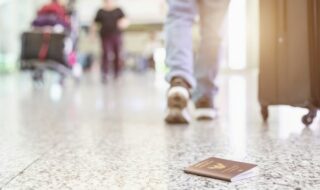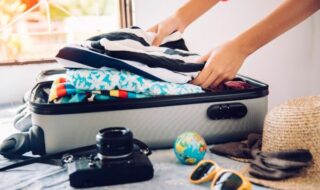
Traveling can generate anxiety — what if I lost my passport, cannot answer an immigration officer sensibly or get accused of bringing any prohibited item I did not bring — but should not cause you frequent trips to the toilet.
But if you eat the wrong types of food, they could trigger even more awful flight experience. It doesn’t help if you find yourself surrounded by restaurants that are characterized by fatty, greasy food, soda and alcohol drinks at the airport. If you are a disciplined traveler, you’d easily be able to avoid the intake of such foods to prepare for that long-haul flight.

So what are the foods we need to avoid on our way to a flight?
Table of Contents
Foods that cause constriction of arteries
Burgers often embody the greasy, artery-clogging fast food menus typically found at airports. They’re attractive because they meant to be consumed quickly. But medical experts claim that our body doesn’t do so well digesting foods laden with sodium and saturated fats in the first place — and digestion at 35,000 feet proves even more difficult. So it’s common sense to avoid these worst offenders before flying.
Call it the laws of gravity or laws of physics, but there are also conditions during 30,000 plus feet above the ground that causes unnatural behavior of our body. Sitting squished and immobile in a pressurized cabin hinders blood flow, and may lead to physiological chain that can lead to swollen feet, or worse, deep vein thrombosis, which involves the formation of a blood clot deep inside the body that when breaks free can lodge in the brain, lungs or heart, causing severe damage, even death.
So skip pre-flight meals that contain high saturated fats, bacon, egg or cheese sandwich since they can cause constriction of blood flow during mid-flight.
Foods that promote bloating
Due to the pressurized cabin inside the aircraft, parts of our body will behave differently. We feel discomfort similar to acute mountain sickness. This is often attributed to factors such as jet lag, prolonged sitting, dehydration, or contamination of cabin air.
Pressurized airplane cabin also promotes bloating, and some foods trigger them: fried and saturated. But even our so-called healthy foods such as cauliflower, beans, lentils, onions, and cabbage can make us feel bloated. This often results in flatulence experienced throughout the entire journey, which can make us feel both embarrassed and relieved at the same time.
The worst thing that can happen is if the flight makes an emergency landing because of this. It happened in 2006 (and possibly in other unreported incidents) when a farting woman concealed the odor by secretly lighting matches during an American Airlines flight between Washington and Dallas. Fellow passengers did not smell passed gas but did smell burnt matches, so they reported the incident which prompted an emergency landing in Nashville.
Foods that cause dehydration
If you happen to down a few cocktail drinks in the airline lounge as your sedative during the trip. But doctors have advised against (excessive) alcohol consumption before and during flights. Alcohol causes dehydration, a concern already raised by air passengers who endure dry cabin air and served salty meals.
To counteract dehydration, ask your cabin attendant for water, not tea, orange juice or soda drinks.
Never mind the special folks in business class who can get all alcoholic drinks they want, but only in limited amounts.
Foods that impede digestion
When you are embarking on a long-haul flight or one with a long layover on the road, imagine yourself as an endurance athlete who requires a body in tip-top shape. This is to overcome weakness due to prolonged expending of energy, but also to fight various forces such as dehydration, boredom, rude passengers, crying babies, and smelly seatmate.
Carbonated drinks — Coca Cola, Pepsi, and so on — contribute to bloating and cramping especially after sitting for long hours on that small economy class space. Resist the temptation of soda, and stick with water to keep yourself hydrated and avoid indigestion that also causes distress (“what if I cannot find the toilet in the middle of the road in a foreign country?”).

Foods that contribute to jet lag and other forms of discomfort
In a study published in the journal “Science,” researchers suggested that fasting for about 16 hours before a long flight may help to fend off jet lag.
The study said that besides light, a second body clock is triggered by hunger of food that controls when we eat and sleep. Researchers believe that manipulating this second clock can help our bodies adapt better to time zone changes.
In short, if we can make our body think it’s starving by fasting or consuming little during our journey, we’ll be able to remain awake and alert until we reach our destination, where we can then address hunger. It must be stressed that the study was conducted on lab rats, and the link has not been found in humans, though it makes a lot of sense if we consider the following effects of eating just about anything during our travel:
- Cheese-filled treats, as tempting they can be, cause gas as they are hard to digest. That is why, after having a cheese-filled snack or meal, we often will feel heavy for a long time.
- Burgers or french fries are likely the best options for travelers as they are easy to consume and accessed anywhere. However, fast food items are likewise hard to digest. A cheesy hamburger will keep us full but can also cause gastric problems as well as increase body weight, a common observation for travelers who divert from usual diets.
- Carbonated beverages like soda and cold drinks cause gastric problems and also cause mouth odor.
- Candies and chewing gums can make us feel better, but the artificial sweeteners loaded in these candies may harm our teeth.
- Chewing gums may help address pressure during landing and takeoff, but it also allows more air to enter inside the mouth thus causing gas.
- Many travelers suffer from an upset stomach while traveling after eating spicy foods.
- Eating starchy foods like noodles and pasta are also hard to digest and cause bloating and gas.
Sounds like we covered all foods to avoid and nothing left to consume safely! But that’s it, traveling can have an impact on our bodies as we move on from our usual body routines: waking hours may vary, we eat different varieties of food and expend more energy than usual. Food may be the culprit here, but they only contribute, not the main reason.








